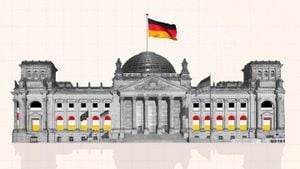The Arab League summit held on February 23, 2025, at its headquarters in Cairo, Egypt, centered on the urgent need for establishing financial mechanisms to support the reconstruction of Gaza, following extensive destruction caused by recent conflicts. Libyan House of Representatives Speaker Aguila Saleh played a pivotal role, articulately calling for the formation of the Arab-Islamic Fund dedicated to developing and rebuilding the war-torn region.
Saleh's impassioned speech highlighted the dire humanitarian crisis faced by Gazans, stating, "Today we meet amid the most dangerous attempts to eradicate the Palestinian cause, following the physical annihilation our people in Gaza have endured over the past 15 months, during which the world witnessed firsthand the killing of thousands of defenseless civilians -- men, women, and children -- and the destruction and burning of their property". This rhetoric underscored the urgent need for collective Arab action and financial support.
The Speaker emphasized the necessity of Arab unity, declaring, "the unity of the Palestinian front necessarily means the unity of the Arab front -- there is no other option". His appeal extends to the governments of Arab countries, urging them to work alongside Islamic nations and international organizations to establish the proposed Arab-Islamic Fund for the Development and Reconstruction of Gaza. This fund, according to Saleh, must be managed by a trustworthy body capable of ensuring effective oversight and accountability.
The summit is poised to lay foundational discussions for another gathering, the emergency summit scheduled for March 4, 2025, aimed explicitly at addressing the dire situation affecting Gaza and Palestine as a whole. Kuwaiti Amir Sheikh Mishal Al-Ahmad Al-Jaber Al-Sabah confirmed his intention to partake, having received the formal invitation during noteworthy diplomatic exchanges earlier this week.
Another significant development was Egyptian Prime Minister Mostafa Madbouli's meeting with the Kuwaiti Amir, where they discussed initiatives for economic cooperation and confirmed the necessity for collaborative efforts to stabilize the region. This reflects growing sentiments among Arab leaders about ensuring security and stability and responding proactively to the Palestinian crisis.
Throughout the discussions at the Arab League summit, leaders reinforced their commitment to collective action. With more than 48,300 victims reported from the recent turmoil, the urgency for mobilizing resources and aid cannot be overstated. The discussions signal potential shifts toward greater collaboration among Arab states to support Gaza's rebuilding, with promises of economic and humanitarian efforts reflecting historical ties to Palestinian solidarity.
Saleh's proposal of establishing the Arab-Islamic Fund embodies hope amid the turmoil, representing the Arab world's collective commitment to address the catastrophic results of conflict on innocent lives. The call for immediate action reverberates among participating nations, emphasizing not just financial help but also the need for stable governance and the reconstruction of social infrastructure within Gaza.
This Arab League summit, marked by strong rhetoric and defined objectives, sets the stage for future cooperation and establishes expectations for the March summit's outcomes. Clear communication among leaders about their shared responsibilities toward the Palestinian people instills hope for progressive initiatives aimed at humanitarian recovery.
With increasing recognition of a united Arab front, the proposal reflects not just financial aspirations but also the embodiment of regional support for the survival and resilience of the Palestinian cause. Leaders are now charged with transforming these discussions and commitments made at the summit and subsequent meetings, including the upcoming emergency summit,into actionable strategies for peace and development.
Both regional and international perspectives are shaping the discussions as leaders prepare for the next summit. The expressed commitment among Arab nations indicates potential pathways toward not just reconstruction but lasting stability, highlighting the importance of unity and collective responsibility within the Arab community. The urgency remains palpable as the situation demands not only immediate financial assistance but also sustainable models of cooperation to secure both humanitarian and infrastructural needs.



